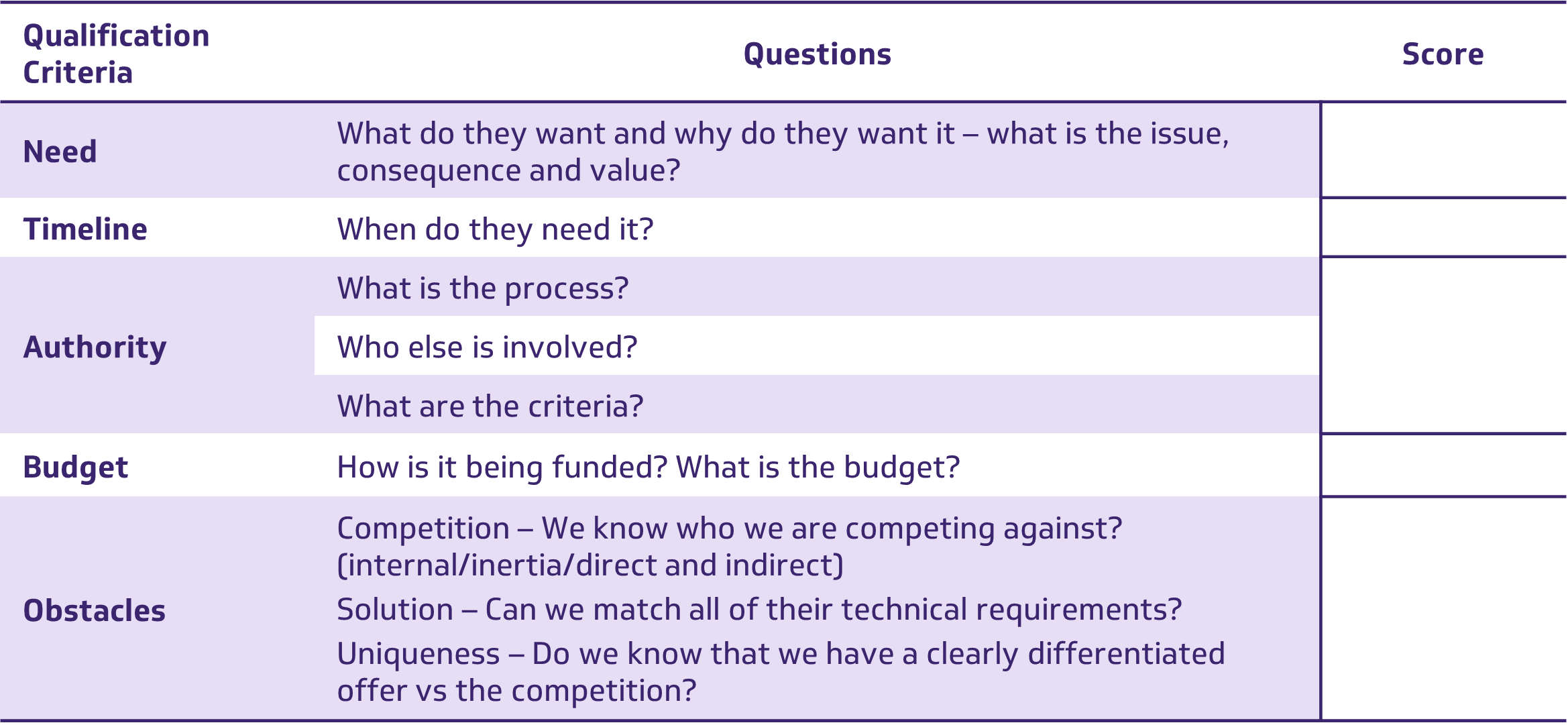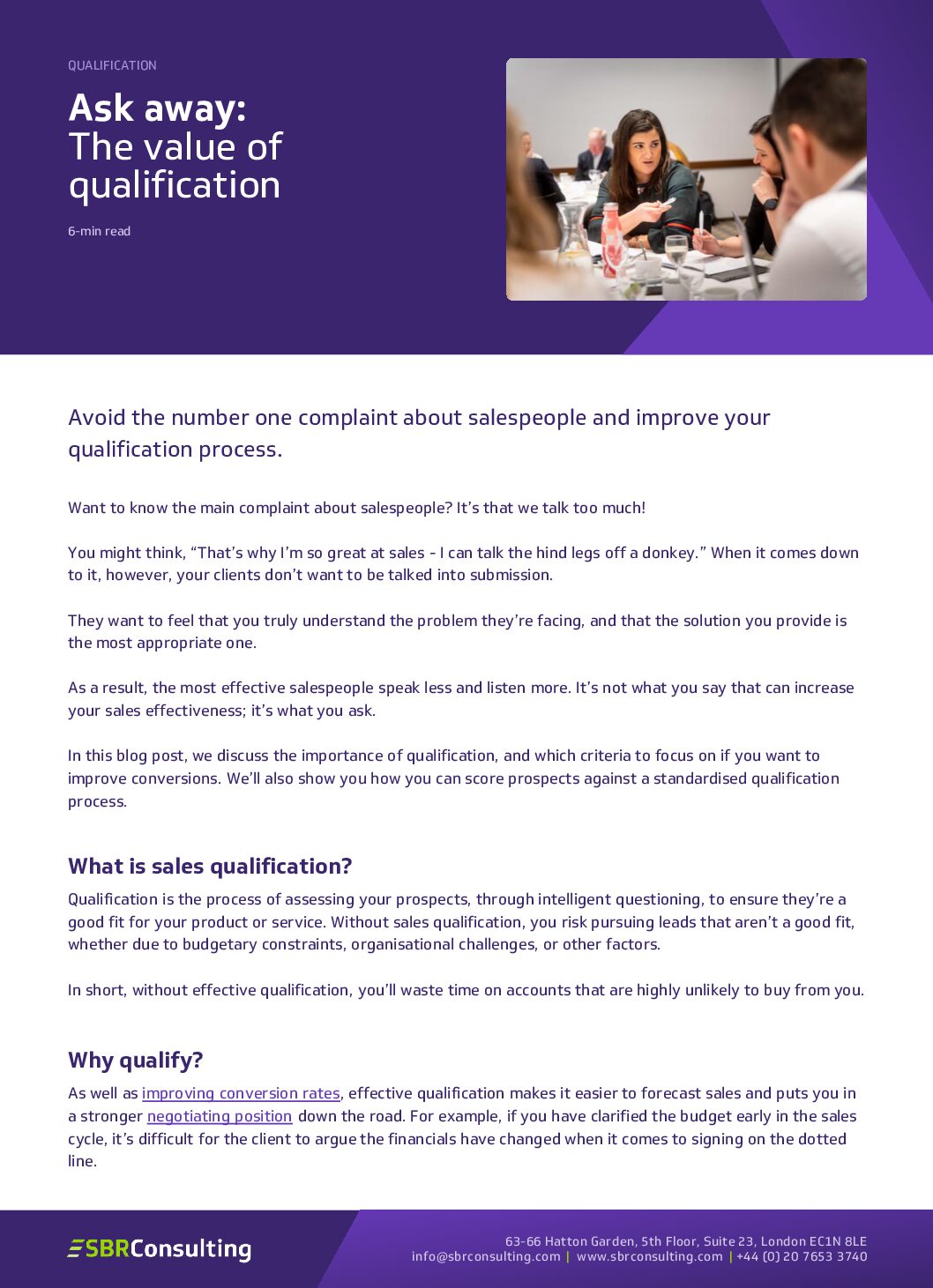
Qualification
Ask away:
The value of qualification
6 min read
Avoid the number one complaint about salespeople and improve your qualification process.
Want to know the main complaint about salespeople? It’s that we talk too much!
You might think, “That’s why I’m so great at sales – I can talk the hind legs off a donkey.” When it comes down to it, however, your clients don’t want to be talked into submission.
They want to feel that you truly understand the problem they’re facing, and that the solution you provide is the most appropriate one.
As a result, the most effective salespeople speak less and listen more. It’s not what you say that can increase your sales effectiveness; it’s what you ask.
In this article, we discuss the importance of qualification, and which criteria to focus on if you want to improve conversions. We’ll also show you how you can score prospects against a standardised qualification process.
What is sales qualification?
Qualification is the process of assessing your prospects, through intelligent questioning, to ensure they’re a good fit for your product or service. Without sales qualification, you risk pursuing leads that aren’t a good fit, whether due to budgetary constraints, organisational challenges, or other factors.
In short, without effective qualification, you’ll waste time on accounts that are highly unlikely to buy from you.
Why qualify?
As well as improving conversion rates, effective qualification makes it easier to forecast sales and puts you in a stronger negotiating position down the road. For example, if you have clarified the budget early in the sales cycle, it’s difficult for the client to argue the financials have changed when it comes to signing on the dotted line.
Qualification also helps create further opportunities to sell different propositions across the organisation, or to sell more of the same proposition into different subsidiaries.
Asking the right qualification questions, in the right context
Sales qualification isn’t a case of asking a series of questions – it’s about how you frame those questions. This approach doesn’t just look at securing a sale in the short term, but helps you position yourself as a trusted expert over the long term.
Proper qualification will help you gain a fuller understanding of the issue the client is facing. At the same time, it will show your prospect that you see implications of taking the wrong action, or not taking any action at all, that they haven’t yet considered.
Overall, your questions should achieve the following objectives:
- For you to fully understand the client’s situation.
- For the client to fully understand their situation (including issues they may not have thought of before).
- For the client to understand that YOU understand their situation.
This is where we return to the complaint about talkative salespeople. If you’re asking the right questions, your prospect will be doing all the talking. A simple approach is to then summarise back to the client, in their own words, what the issue is.
Depending on the service or product you’re offering, this process (of questioning, understanding, reframing, and clarifying) may take place over one or several meetings.
Using an effective sales qualification framework
At SBR, we use the NTABO framework to assess the client’s need, timeline, authority, budget, and any potential obstacles.
Again, depending on your product or service and the length of your sales cycle, you may need several meetings to obtain this information. You may also need to consult several different sources (whether in the client organisation or among external sources).
So, what does this look like in a real-world sales situation? In this webinar, our co-managing director Stuart Lotherington discusses a deal that had stalled with managing consultant Jonny Adams.
In this framework:
0 = “We definitely don’t know.”
1 = “We think we know but don’t have any evidence to support it.”
2 = “We have a strong indication because of XYZ.”
3 = “We have had this information confirmed by the prospect.”

Scoring each criterion helps determine where you need greater insight to move the deal along. This approach is most effective when a colleague really presses you on your information to see where more work is needed.
In this particular situation, the organisation had recently been acquired. Due to restructuring, the decision-making unit had changed. Not only did this exercise help Stuart plan his next steps, it also helped forecast when the deal was likely to close – whether the following month or the following quarter.
Jonny says:
“It’s critical the way that you can conduct this is in a peer to peer or personal format. You don’t need a leader to do this. Ultimately, it’s about asking questions, challenging each other. Although Stuart felt that he knew about his opportunity, by me questioning him and asking him, it got him to the point where he knew which actions to focus on.”
In summary
As we’ve mentioned, your approach to sales qualification will be heavily influenced by the product or service you’re offering. However, introducing an effective framework such as NTABO will enable you and your team to increase conversions. It will also bring more accuracy to forecasting (both as an organisation and among individuals), and ultimately build better long-term relationships with your clients.
For a more in-depth look at how to apply the NTABO framework and the importance of a consultative approach, you can watch a replay of the webinar here.
To discover more about the qualification process, let’s talk growth.



